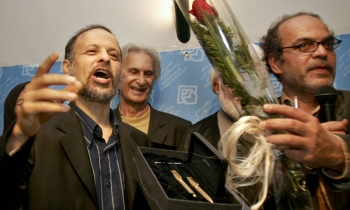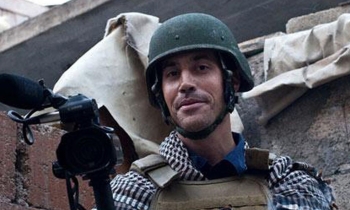JERUSALEM - In a land of divided faiths and loyalties, people have been separated at times by walls, by checkpoints and now, in time of war, by sound bites.
Every hour on the hour, Israeli Jews in this ancient city tune their radios to government-run broadcasts about the battle against Hezbollah, a radical Shiite Muslim group, in Lebanon. At night they turn to three Hebrew-language television stations, whose reports focus on the Jewish state's military strategy, its soldiers' performance and a national call to arms against Islamic threats.
In Palestinian shops, Al-Manar television, Hezbollah's mouthpiece and an anthem-packed source of news and anti-Israeli invective, is the channel of choice. Al Jazeera, the most watched channel in the Arab world, is favored when breaking news warrants team reports on the latest "Israeli aggression."
Hebrew and Arabic-language broadcast coverage of the fighting looks and sounds different and reflects another front in the deadly battle for south Lebanon. Television news channels explain the war through mini-dramas of emotion and fact. Reporters identify with their fighters' struggle. Commentators convey the stakes: All the stories are part of a war effort and ammunition for future negotiations and debate.
"Both Arabs and Israelis want questions and answers and details to fit their cultural and emotional outlooks," said Khalil Rinnawi, an Israeli Arab lecturer at a university in Tel Aviv who has extensively studied Israeli and Arab television and press.
"Israeli media is completely mobilized by the Israeli view of the world," Rinnawi said. "Arab stations like Al Jazeera are competitive and know they have to be on the Lebanese side to be popular and have ratings."
Last week, as Israeli ground troops prepared a massive incursion into Lebanon, some senior officers appealed to Israeli journalists to "be responsible" and feature the achievements of their fight.
Generations of Palestinians, Israeli Jews and Israeli Arabs weaned on years of conflict know the tactic well. Many say they realize the pressures on their broadcast worlds, and few interviewed in the last week were troubled by such imbalance. Most want to hear more, but only from their side.
"All the channels have agendas. But I believe the Arab stations more than the others," said Ghazi Zalum, a Palestinian who keeps the TV blaring from morning till night at his kebab shop in East Jerusalem.
"No one trusts the Israeli news - I only trust about 40 percent of the news on the Israeli channels," he said. "But people are educated here, and they can judge what's being reported. The Arab reporters are everywhere."
Nor is there trust of Arab media among Jews.
"Their position is that Israel offends them by its very existence," said Eli Stern, who teaches Middle Eastern studies at Hebrew University in Jerusalem. "Mostly I listen to Israeli radio, some television, and I accept what they describe as far as the technical issues. ... The political reporting, you can't really trust to reflect reality. There can be bias.
"I listen to the military experts and army officials, and I think I get a fair understanding of what is going on," Stern said.
A review of reports over the last couple of weeks from Israeli and Arab-based media shows that the sharp division of opinions between the two camps is reflected in their news, and the news itself may be causing an even wider divide.
There is plenty to watch - Israeli stations alone have expanded coverage some days from three hours to 15 - but critical judgments of that coverage from the opposing sides are vexed by some simple realities.
Most Palestinians and Israeli Jews don't speak the other's language well enough to argue the merits of the coverage. Palestinians can tune in to Israeli broadcasts but rarely watch. Israelis can choose Arabic-language channels as part of their cable subscriptions.
A media revolution has occurred in the last quarter-century since Israel last fought a cross-border war. Newspapers matured. The Internet was born. Technological advances sped and enhanced the ability of television and other media to report events in real time. Information barriers fell in large part due to the dawn of satellite television, making news blackouts impossible even in the most restrictive Arab regimes.
Last month, after Hezbollah militants abducted two Israeli soldiers in a cross-border raid and Israel attacked in response, such change funneled a flood of information, both government-supplied and produced by independent news organizations, into newspapers, Web sites and broadcast outlets.
Still, television reigns in time of war.
Broadcasts have shown Israeli warplanes targeting Hezbollah and Lebanon's southern countryside where the militia rules. Thousands of people have fled Lebanon; hundreds have been killed.
In northern Israel, hundreds of thousands under Hezbollah rocket attack have moved to local bomb shelters or other parts of the country. Thirty civilians have died from Hezbollah's repeated barrages deep into Israel. Israel's military power has been unable to stop the attacks.
The basic facts are covered on Israeli and Arab broadcasts, but balance is another matter.
The favorite analysts on Israel's government-funded station and two commercial channels are former generals and former intelligence officers who see the offensive against Hezbollah as a fight against the spread of Shiite radicals aimed at destroying Israel. They all see Iran and Syria, which support Hezbollah, as part of the threat. One commercial station, Channel 10, appears to add more voices to discuss the war's purpose, but its coverage, in total, sounds much like the other channels.
Arabs who want to know the consequence of attacks in Israel hear no conversations with beleaguered Israelis on Al-Manar and only brief such reports on Al Jazeera. Instead, Al Jazeera viewers hear infrequent, short interviews with one or two Israeli army or Foreign Ministry officials, Arabic speakers, who describe the attacks.
Arab channels largely describe the fighting as an Israeli adventure. The idea that combat began because Hezbollah fighters crossed the border and attacked Israelis on July 12 is not explored; instead, the war is framed as a window on Israeli ambitions to seize Arab and Muslim land.
The Arab stations emphasize civilian deaths in Lebanon. The argument that civilians are deeply tied to Hezbollah and that Hezbollah plants fighters and weapons in civilian areas - heard many times on Israeli media - is dismissed as no excuse for Israel's bombing campaign.
Al Jazeera, based in Qatar with reporters throughout the Middle East, calls itself politically independent, but field reports often lace dispatches with emotion. Al Jazeera reporters pepper their accounts of Lebanese suffering with the phrase "amid the silence of the international community." On air, Lebanese dead are always referred to as martyrs. Israel is the aggressor or the Zionist enemy.
The presentation differs from that of other Arab satellite channels such as Al-Arabiya, based in Dubai. Its reporters describe death counts with little editorializing, and the video often is less graphic.
But Al Jazeera and Al-Manar apparently understand what their audiences want. Every Palestinian interviewed for this article preferred Al Jazeera's language and presentation and Al-Manar's coverage to Al-Arabiya's.
"Al-Arabiya is like America," said Mahmoud Abu Nidal, a phone store owner whose words echoed the thoughts of many in his East Jerusalem neighborhood. "They don't call people resistance fighters. They don't focus on Gaza. They call people in Iraq terrorists. Al Jazeera is with us more, and speaks to us more."
Yoram Peri, a professor of political sociology and communication at Tel Aviv University, said television produced in any country at a time of war plays to the emotions. Viewers in the U.S. experienced the same phenomenon when American troops invaded Iraq in 2003, he said.
Israeli television seems to be at a disadvantage this time by the very nature of its medium, Peri said. It simply cannot match its pictures to the level of the terrorist threat that the Israeli government sees in Hezbollah. The destruction in Lebanon is more visual.
Suicide bombings in Israel conveyed the message better, he said. Videos of the carnage telegraphed terror.
"Logical arguments don't play well on television. It's the emotional picture they look for," Peri said. "If you don't have those pictures, you don't get that coverage."
The day after Israel lost eight soldiers in tough ground battle in Bint Jbeil, a town where Hezbollah guerrillas and Israeli soldiers fought face-to-face, Israeli news presented sympathetic views of the battle.
Channel 2 and Channel 10, the commercial channels, presented a variety of emotional stories: funerals, memorials to the fallen Israeli fighters, a visit to a local hospital to see wounded teenage soldiers.
Channel 1, the state-funded channel, presented the news with an emphasis on the methods of battle and with analysts largely respectful of the war. Channel 2, which promoted its coverage with the slogan "Israel Fights," seemed to offer unabashed support at times. But it also portrayed injured soldiers who were not so glib about battle. One soldier said he felt like cannon fodder. Others said they wanted to return to the front to fight. Channel 10 offered some voices of dissent, but it also broadcast a program with hosts, at an air base, sitting in front of an F-16 fighter jet.
Al-Manar and Al Jazeera presented the losses as proof that Israel was vulnerable to Hezbollah. Al Jazeera, which promotes its coverage of "The Sixth War," referring to Israel's previous wars in the region, presented several field reports with reporters in Lebanese villages and from the Israeli city of Haifa. It also interviewed Israeli army officials who spoke Arabic directly to every question. It used much of its prime-time coverage to interview Mohammed Hussein Fadlallah, a leading Shiite cleric close to Hezbollah's interests.
Fadlallah urged that "everybody has a gun and should use it against the Israeli enemy." He also repeatedly accused the United States of manipulating the war. "They are the enemy. They are always on the Israeli side," he said. "The (Bush) administration likes blood and war - at the same time, they talk about democracy and human rights."
Israel's July 30 air strike on Qana, Lebanon, in which numerous children were killed in a residential area, provided a sharp contrast in coverage.
For hours, Al Jazeera ran a loop of tape in which a woman was shrieking in horror. Her entire family was dead. The video was among the most graphic on Arab television. The cameraman closed in on the dead as they were pulled from the rubble. Dirt crusted their faces. The bodies were limp.
No report, in hours of viewing, indicated that Israel acknowledged the strike was a mistake. Both Al-Manar and Al Jazeera opened their airwaves to call-in shows. Many viewers spoke emotionally against Arab governments for allowing the war in Lebanon. The deaths in Lebanon, in news reports and in on-air conversations, were called "a massacre."
In contrast, the Israeli stations drew in experts, generals and former government ministers to explain how the strike occurred and how the raid would affect Israel's chances to advance on Hezbollah. There was a recognition that something terrible had happened. All reporters and anchors repeatedly called the strike "a tragedy."
Anti-war activists were given more airtime than at any other period that week. But much time was spent on supporters giving their view on why Qana was targeted: It was a Hezbollah stronghold. Israel attacked Qana 10 years ago, and a similar deadly mistake occurred. The overwhelming Israeli opinion, on all channels, was that the fight then and now was necessary.
Former Defense Minister Benjamin Ben Eliezer offered one of the blunter assessments of that day:
"It was a tragedy, OK," he said on Channel 1. "But should we raise our hands? . . . Stopping war is a victory for Hezbollah, Damascus and Iran. It hurts, I agree. But we have to think once, twice, three times on this.
"We're having a war in order to have peace."









